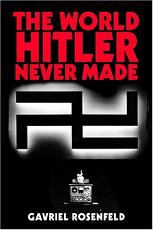
The World Hitler Never Made
Gavriel D. Rosenfeld
462 pages, including index and notes
published in 1990
Alternate history is a subgenre of science fiction, which revolves around asking what if the great historical events of the past happened differently, what would the world look like then? It's unique in that it was invented twice at roughly the same tinme: in the pulp science fiction of the 1930s, but also amongst serious historians at the same time, independently of each other. Murray Leinster introduced the idea to science fiction in 1934, in "Sideways in Time", while three years earlier a collection of alt-historical essays had appeared under the title If it Had Happened Otherwise, which contained contributions by such people as Winston Churchill. Much of what appeared int he pulps on this subject was of course the usual science fiction nonsense, not at all related to true history; it was only after World War II that science fiction writers would get interested in proper alternate history stories, rather than stories about visiting alternate worlds, with no resemblance to our own.
The reason is obvious: the Second World War seemed so much the work of an evil genius, Adolf Hitler, that it was very tempting to ask what would've happened if he hadn't existed. At the same time, the menace of the nazis was so clear and the consequences of their victory so horrible that again, it was tempting to ask what would've happened if... Finally, there's also the fate of Hitler himself, who disappeared at the end of the war, allegedly having committed suicide. Because the Russians refused to confirm his suicide until the end of the Cold War, the road was clear for speculation about what else might've happened...
The Second World War is therefore the most popular of all alternate history subjects, with countless pulp stories set in worlds where the Nazis won the war, or where Hitler survived the war and is hiding in Argentine, but also with more serious treatments, by historians and novelists both. It was perhaps only a matter of time before this endlessly popular subject would get the academic treatment. Enter Gavriel D. Rosenfeld's The World Hitler Never Made.
In it, Rosenfeld looks beyond just the possiblity of a nazi victory in World War II, to alternate worlds without a Hitler, worlds in which the Holocaust either didn't happened or differently, or even succeeded and to stories in which Hitler in one way or another survived World War II. His goal is to present an overview of how the nazis, Hitler and the Holocaust have been used in alternate history, as an indicator of how society at large thinks about these things. He looks therefore not just to the US and the UK, but also to Germany itself as well as other countries. The end result is an exhaustive (for example, he mentions Harry Mulisch's attempt at writing an alternate World War II story) catalog of alternate histories dating back to before World War II, from which Rosenfeld attempts to derive some conclusions.
He attempts to do this by looking at how a given alternate history story functions: does it portray a nightmare or not, is the story meant to depict a better or a worse off world, does it criticise or glorify the present in which the story was written. Rosenfeld also looks at how a story was received: was it succesful or not, did it cause controversy, etc and who wrote it and what their motives were. finally he looks at how perceptions changed over time. All this together gives an insight in how various countries, the US, Great Britain and Germany, changed their ideas about Hitler and the nazis, about World War II and their own role in it.
In these changing attitudes Rosenfeld detects a normalisation of Naziism, in which Hitler and his supporters slowly change from being the avatars of ultimate evil, and the Holocaust as the ultimate crime against humanity, towards being far more ambigious villains, still evil but not uniquely so, with the Holocaust placed in a proper context amongst crimes almost or just as bad (e.g., the Armenian genocide, or the genocide in Ruanda.)
There are some differences in how different countries undergo this process or normalisation. In the UK alternate history stories at first confirmed the "official" veiw of plucky, good Brits versus goosestepping, evil Germans. Later stories, starting with such thrillers as Len Deighton's SS-GB showed a more naturalistic view, that a Nazi victory might not be resisted that much, even welcomed, by quite a few British, that most of the people would've collaborated or at least not resisted a German occupation, just like most people in occupied Europe did in real history.
In America what Rosenfeld sees happening is the transformation of alternate histories as a confirmation that the US did the right thing in intervening in World War II, to a questioning of whether this intervention was actually in the best interest of the country, and whether things would've worked out better had Nazi Germany mnaged to defeat the Soviets, so saving the US the long Cold War.
In Germany meanwhile alternate history was part of a larger debate about the "renormalisation" of german history, which seems to break out once very decade or so, when rightwing historians and politicians decide the German people have suffered enough for Hitler's crimes. In this context, an alternate history that showed a victorious Nazi Germany wouldn't have been all that bad was welcomed by that side that thought Germans should be able to be proud of their country again...
To conclude then, The World Hitler Never Made is a fascinating, if at times slightly worthy book, which should be of interest to anyone who's interested in alternate history and/or Nazism and its potrayal in pop culture.
Read more about:
Gavriel D. Rosenfeld,
The World Hitler Never Made,
alternate history,
book review